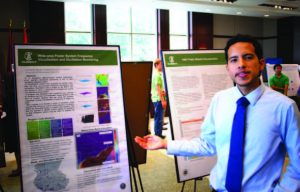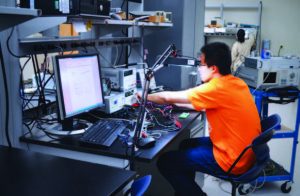CURENT offers a Graduate Certificate for students interested in expanding and solidifying their understanding of power and energy systems.
The Certificate in Power & Energy Systems is intended for currently admitted graduate students in electrical engineering, computer engineering, or computer science. The certificate requires a minimum of 18 hours with a minimum grade of B in each course. The requirements are listed below:

Required Course:
ECE 620 – Ultra-Wide-Area Resilient Electrical Energy Transmission Networks
(3 hours) Will include ultra-wide-area monitoring, measurement, situational awareness analysis, visualization, actuation and control; modeling, simulation and fast computation for power system analysis; power system state estimation and prediction; transmission network architecture; multi-level flat control architecture; market effect and social impact of energy issues; communication and cyber security; large-scale system test bed; and hardware test bed.

Technical Concentration (at least 4 courses)
ECE 511 – Linear Systems Theory
(3 hours) State space models of linear dynamical systems, linear algebra, state transition map, matrix exponential, controllability, observability, realization theory, and stability theory.
ECE 512 – Multivariable Linear Control System Design
(3 hours) Design of controllers, for multivariable systems, which satisfy constraints on robustness to plant uncertainties, disturbance rejection, command following.
ECE 521 – Power Systems Analysis I
(3 hours) Matrix-vector representations of power networks, sequence modeling of power system components, unbalanced shunt and series faults. Formulating and solving problems in matrix-vector form with application to large scale power systems.
ECE 522 – Power Systems Analysis II
(3 hours) Operation and control of interconnected power systems, transient and dynamic stability. Formulating and solving problems in matrix-vector form with application to large-scale power systems.
ECE 523 – Power Electronics and Drives
(3 hours) Principles, pulse-width modulation techniques, and control for three-phase power converters. Average models of three-phase converters in stationary and rotating reference frames. Small-signal models in rotating reference frame and control design. Three-phase inverter applications as motor drives. Drive system modeling and control.

ECE 525 – Alternative Energy Sources
(3 hours) Energy outlook, interconnection issues of distributed energy resources, efficiency of power production, electric energy conversion and storage. Photovoltaics, fuel cells, wind turbines, microturbines.
ECE 619 – Application of Constrained Optimization
(3 hours) Linear programming, mixed integer programming; weak and strong duality; convexity; quadratic programming; graph search methods; goal programming; gradient and derivative free methods; population and data-driven approaches; emphasis on formulations.
ECE 621 – Computational Methods for Power System Analysis
(3 hours) LU factorization, sparse matrix techniques, advanced power flow solutions using Newton-Raphson and fast decoupled methods, continuation power flow, three-phase power flow, power system state estimation, numerical integration and its application to power system transient stability, eigenvalue analysis and its application to voltage stability.
ECE 622 – Power System Economics
(3 hours) Organization of electricity markets, participating in electricity markets from producers’ and the consumers’ perspectives, ancillary services, transmission investment, and generation investment, mathematical optimization and its application to optimal power flow, locational marginal pricing, transmission congestion management, forward markets.
ECE 623 – Advanced Power Electronics and Drives
(3 hours) Design of three-phase power converters. Control design, semiconductor device selection, passive components design and selection, loss calculation, thermal design, protection, and auxiliary circuits. Interface issues with source and load. Harmonic and EMI filters. Drive system design.
ECE 625 – Utility Applications of Power Electronics
(3 hours) Electric power quality, harmonics, voltage sag, reactive power compensation, transient stability. Structure and control of power converters, multilevel converters, active power filters, static series and shunt compensators, FACTS, HVDC.

ECE 626 – Solid State Power Semiconductors
(3 hours) Semiconductor physics and circuit models. Power diodes, power MOSFETs, thyristors, GTO thyristors, IGBTs, emerging devices and circuits. Wide band gap power semiconductors. Solar cell device physics.
ECE 627 – Wide Area Synchronous Measurements and Applications
(3 hours) Covers a broad range of topics in electric power wide area synchronous measurements and applications. Students will learn fundamental concepts in synchronous measurements, current industrial applications, and the state of the art of the power system wide area measurements research. Upon completion of this course, students will understand the latest development in the area, be ready to work in the related field in power utilities, and to carry out researches in power grid operations and control.
ECE 628 – Power System Transients
(3 hours) Major focus of course is to train students to effectively simulate electric transients using tools like EMTDC/ PSCAD in power systems; and to provide students the ability to analyze electric transients in power system circuits and applications. Projects will be based on EMTDC/PSCAD simulations or equivalent.
ECE 631 – Advanced Topics in Mixed-Signal Integrated Circuit Design
(3 hours) Design and analysis of mixed-signal integrated circuits for data acquisition and other applications requiring combined analog and digital functionality. Design and simulation techniques using modern industry-standard tools.
ECE 642 – Wireless Communications
(3 hours) Fundamental theory and design of wireless communications systems; mobile radio propagation; modulation techniques; coding, diversity and equalization. Wireless systems and standards.

Entrepreneurship, Economics & Innovation Course
Choose from (1) Mechanical Engineering 519 or (2) Industrial Engineering 518